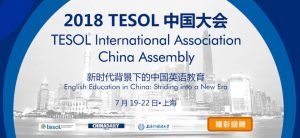
Editor’s note: In this piece, TIRF Trustee Dr. David Nunan shares information about the assembly in China, co-organized by TESOL International Association, which took place earlier this month in Shanghai. Please note that TIRF Trustees travel at no cost to the Foundation.
In July, three members of the TIRF Board of Trustees, Andy Curtis, Jun Liu, and David Nunan, took part in the Inaugural TESOL International Association China Assembly. The Assembly took place at the Songjiang Campus of the Shanghai International Studies University (SISU), and was jointly organized by TESOL International, the China Daily, and the Shanghai International Studies University. The Academic Committee for the event included TIRF Vice President Jun Liu and TESOL Past President Esther de Jong.
In his opening keynote address, David Nunan revisited the concept of learner-centered language education (one of the conference themes) in light of globalization, technology, and the 21st-century competency movement. Andy Curtis spoke on action research in the language classroom. He argued that adding an action research agenda to one’s professional practice can increase the quantity and quality of teaching and learning taking place in the classroom. In his closing plenary, Jun Liu identified what he sees as seven factors shaping the future of English education in China.
Other keynote presentations included the integration of content and language (Esther de Jong), learning from students’ memories of past English textbooks (Cheng Xiaotang), optimizing students’ learning through technology-enhanced learning tasks (Joy Egbert), the impact of China’s new competency framework for the senior high school English curriculum (Mei Deming), and the potential impact of the new Chinese Scale of English on ELT in China (Liu Jianda). The transformative effect of innovation, change, globalization, and technology on English education in China was echoed in many of the parallel sessions presented at the Assembly.
Overall, it was an impressive event. Its success was due in no small part to the partnership between the three organizing institutions. TESOL brought its academic and organizational experience to the creation of an outstanding program, the state-of-the-art SISU auditorium was an impressive venue for the keynote presentations, and China Daily’s technology and media presence not only significantly enhanced the quality of the event, but took it beyond Shanghai to the rest of China, and, indeed, to the world.


